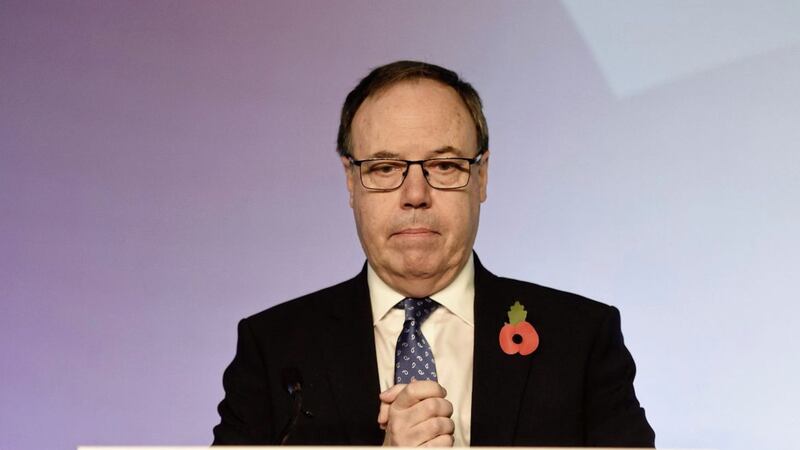Nothing better illustrates the hopeless corner the DUP has backed itself into than its first party political broadcast for next month’s election, which does not mention Brexit or even allude to it.
This incredible omission cannot be explained as tacitly admitting powerlessness on the issue. In the three-minute video, leader Arlene Foster promises the election will be “close” and the DUP could have huge influence at Westminster again. However, this is portrayed as an opportunity to secure more confidence and supply funding for Northern Ireland. The rest of the broadcast focuses entirely on the need to restore devolution, which is bizarrely beside the point in a general election.
What this admits is that even if the DUP was returned to Westminster with decisive influence over Brexit, it would still have no idea what to do with it.
A final absurdity is the assumption a strong vote for the DUP sends a signal to get back to Stormont. That signal is sent by no longer voting DUP or Sinn Féin, as the electorate has clearly figured out.
**
The DUP and Labour’s fisheries spokespersons have sent a joint letter of concern to the government after discovering the unique arrangements for Northern Ireland in the Brexit deal do not include Northern Ireland’s territorial waters.
This means the sea border, commonly said to run down the middle of the Irish Sea, would in fact run directly along our shore. A fishing boat heading out any distance would be treated as entering the EU on its return to the quayside, subject to tariffs and quotas and requiring a mountain of certificates.
On the plus side, loyalists could combine their Brexit protests with a day at the beach.
**
We are all familiar with Sinn Féin’s arguments for using Shankill bomber Sean Kelly as an election canvasser and why unionists have no grounds to complain. The question is why the party chose to have these entirely foreseeable arguments again, in this of all elections, for the sake of one more person handing out leaflets in North Belfast. Kelly’s presence can only repel the SDLP and Alliance voters Sinn Féin needs, let alone the unionist Remainers candidate John Finucane says he wants to attract. It is also guaranteed to galvanise support for DUP incumbent Nigel Dodds.
A unique election of Brexit pacts should allow republicans to find an honourable reason, even in their own terms, to ask Kelly to sit this one out. But a quarter-century after the ceasefires, it still seems nothing matters more to Sinn Féin than defending the Troubles record of the IRA.
**
Unionists are finally involved in a Brexit pact, although not in a way anyone imagined. Sinn Féin, the SDLP, the Greens and Alliance have backed a campaign by the Northern Ireland branch of Our Future Our Choice (OFOC), the youth organisation for a number of anti-Brexit groups including Best for Britain and Open Britain. The campaign will endorse candidates and advocate tactical voting to return as many Remain MPs as possible.
OFOC takes an overtly unionist line in Britain and particularly in Scotland, where it campaigns against Brexit on the basis it could break up the UK.
It will be interesting to see its tactical choice on playing that risk up or down here.
**
The Orange Order has once again ignored a request from Mary Lou McDonald to meet and discuss attending Twelfth celebrations.
The Sinn Féin president described this as “a great pity” and there is no doubt she has significantly shifted her own position. In 2000, while chair of the Irish National Congress, McDonald succeeded in stopping an Orange parade in Dublin, arranged by Labour councillor Mary Freehill to mark the unveiling of a plaque where the Grand Lodge of Ireland first met.
“There is a big difference between accommodating Protestant traditions and accommodating the sectarianism of the Orange Order,” McDonald said at the time.
Today, her comments on outreach are indistinguishable from Freehill’s 19 years ago.
**
The PSNI has allocated an officer to deal with the vandalising of bilingual English and Irish road signs in mid-Ulster, where the council has already said it will install CCTV cameras to monitor the most commonly-defaced examples.
If technology is the answer, this is not where it is heading. The government has just announced funding for six trials in England, including Birmingham and London, to replace road signs with signals broadcast to cars and phones. A full-scale experiment is already running in Bedford, with the aim of making all highway signage redundant by 2027. Town and village boundary signs of the type being attacked in Mid-Ulster are different, of course, with visibility of languages being the point. But once invisibility becomes an option, it could be hard to resist. Imagine being able to select whether you see ‘Derry’ or ‘Londonderry’ on your windscreen as your drive up the A6 - or more likely, the internet knowing which one you prefer.









